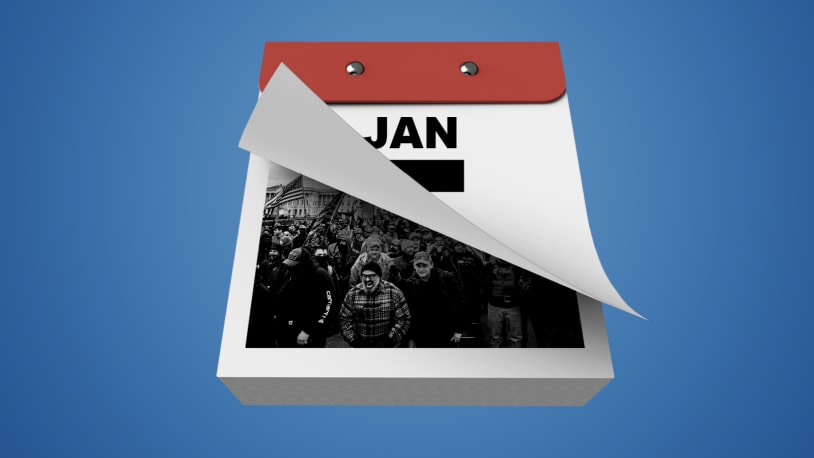
What’s changed since Jan. 6, 2021?
It’s been two years since a mob of Trump supporters stormed the U.S. Capitol to protest the outcome of the 2020 presidential election. Since then, hundreds have been arrested, and a congressional committee investigating the incident has suggested that former President Donald Trump had a hand in inciting the violence. Here’s what you need to know about where things stand on the two-year anniversary of Jan. 6:
How many people have been criminally charged in connection with the Jan. 6 incident?
Over the past two years, the Justice Department has been entrenched in an investigation into the events of Jan. 6, which The New York Times calls “the biggest criminal inquiry” in its “153-year history.” For the department’s deep dive, the DOJ confiscated hundreds of phones, responded to tens of thousands of tips, and questioned thousands of witnesses. Their efforts have led to the arrest of approximately 950 people as of Jan. 4, 2023, per the Times.
A small portion of those arrested have been charged with seditious conspiracy for their involvement in planning the event. The Washington Post reports that the “prosecutors revived the charge of seditious conspiracy, rarely used in recent decades, to accuse the attack’s leaders of conspiring to oppose federal authority by force.” The 18 people charged with that crime are all members of the Proud Boys and the Oath Keepers militia. These two far-right organizations played “central roles in attacking the Capitol and disrupting a pillar of American democracy on Jan. 6: the lawful transfer of presidential power,” per the Times.
Most of those arrested have been charged with either assaulting or resisting an officer, or the lesser crime of obstruction of an official proceeding before Congress. The Times estimates that 284 people have been charged with the more serious assault charge. The stiffest sentence so far went to Thomas Webster, a retired NYPD officer, who was given 10 years in prison for assaulting an officer with a flagpole.
Prosecutors have been using the obstruction charge, initially intended to “prohibit things like shredding documents or tampering with witnesses in congressional inquiries,” to deal with how the mob chased legislators out of the Capitol to disrupt the certification of the election, per the Post. Two hundred and ninety-five people have been charged with obstruction, including Jacob Chansley, known as the QAnon Shaman, who was sentenced in late 2021 to 41 months in prison.
So far, only 69 of the over 460 people charged with felonies have been convicted and sentenced, and all but four of them received jail time, per the Post. According to the Post database, the average sentence length is 33 months.
Still, as the Times points out, “Scores, if not hundreds, more people could face charges in the year — or years — to come, spread out over the course of many months so as not to flood the courts.”
What are the supporters of the rioters up to?
Despite mounting evidence and a number of guilty pleas, there are still many support groups advocating for the “Jan. Sixers.” Two years in, right-wing supporters have continued to form prayer chains, facilitate letter-writing campaigns, host vigils, and have fundraised millions to support the legal defense of the group they view as “valiant patriots, prisoners of conscience persecuted for engaging in their First Amendment rights,” per the Post.
Jan 6. defendants have raised over $3.7 million since 2021 through the Christian crowdfunding site GiveSendGo, per the Post, and millions more have been raised by outside groups in their name. A significant amount of the money has been used to support the families of those incarcerated, offset legal fees, and add to their commissary funds.
Supporters have planned to mark the two-year anniversary of Jan. 6 with vigils in defense of the incarcerated in Colorado, Connecticut, Florida, Georgia, Idaho, Pennsylvania, and Texas. In D.C., “where 21 detainees are still housed in a special wing awaiting trial,” supporters continue to gather for nightly candlelight vigils to protest the treatment of the prisoners they consider hostages. “At 9 p.m., they sing the national anthem while prisoners above turn the lights of their cells off and on,” says the Post.
Where does the investigation into Trump stand?
Before disbanding, the House Select Committee to Investigate January 6 announced the unanimous decision to refer the former president to the Justice Department on four criminal charges: obstruction of an official proceeding; conspiracy to defraud the United States; conspiracy to make false statements; and criminally inciting, assisting, or aiding or comforting an insurrection. Their final report also recommended that Congress ban Trump from running for office.
Whether or not the DOJ decides to follow the committee’s recommendation will ultimately be decided by Attorney General Merrick Garland. Prior to the disbanding of the committee, Garland appointed Jack Smith, a veteran DOJ prosecutor, to oversee the department’s two ongoing investigations into Trump’s involvement in inciting the Jan. 6 riots and his decision to hold sensitive government documents at his Mar-A-Lago estate. Eventually, Garland will determine if the investigation merits criminal charges if they find Trump violated any federal laws.
It’s been two years since a mob of Trump supporters stormed the U.S. Capitol to protest the outcome of the 2020 presidential election. Since then, hundreds have been arrested, and a congressional committee investigating the incident has suggested that former President Donald Trump had a hand in inciting the violence. Here’s what you need to…
It’s been two years since a mob of Trump supporters stormed the U.S. Capitol to protest the outcome of the 2020 presidential election. Since then, hundreds have been arrested, and a congressional committee investigating the incident has suggested that former President Donald Trump had a hand in inciting the violence. Here’s what you need to…